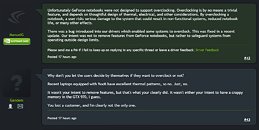Thursday, February 12th 2015

NVIDIA Disables GeForce GTX 900M Mobile GPU Overclocking with Driver Update
With GeForce R347 drivers (version 347.29), NVIDIA disabled overclocking on its GeForce GTX 900M series mobile GPUs. Buyers of new notebooks, and using older drivers, with the chips fell under the impression that like their desktop counterparts, the GTX 900M series support overclocking, until they updated their drivers to 347.29, to find that their overclocks were wiped back to reference clocks, and overclocking using third-party tools was disabled.
When angry users took to the official GeForce forums to report the bug, NVIDIA explained that overclocking on the GTX 900M series was enabled by accident, and has since been disabled with the recent driver updates. This explanation was met by angry reactions by users who argued that they should be allowed to use the hardware as they want, even if it voids their warranties. Historically, overclocking was allowed on NVIDIA GPUs.
Source:
NVIDIA GeForce Forums
When angry users took to the official GeForce forums to report the bug, NVIDIA explained that overclocking on the GTX 900M series was enabled by accident, and has since been disabled with the recent driver updates. This explanation was met by angry reactions by users who argued that they should be allowed to use the hardware as they want, even if it voids their warranties. Historically, overclocking was allowed on NVIDIA GPUs.

160 Comments on NVIDIA Disables GeForce GTX 900M Mobile GPU Overclocking with Driver Update
this just leaves people scratching heads when they end overclocking on mobile gpu's with a new architecture and let everyone do so for months.
lame excuse.. someone needs to get to the bottom of it.
Seriously tho anyone familiar with limitations of mobile devices would be mad to OC a laptop.
Look what I found digging through my old emails, LOL. If NVIDIA doesn't reverse their ludicrous and unfounded position on MXM overclocking, we may get to have another nasty dance.
I'm going to go out on a limb and say 45% of laptop owners don't overclock either GPU or CPU, and I doubt even desktop ownership sees anything close to that kind of number.
As for the issue itself, as an enthusiast it always grieves me to see vendors and manufacturers treat us like toddlers found playing with matches. From the point of view of the business as whole, I'm remain perpetually surprised that mobile (given the high return rate) isn't fully locked down, plastered with tamperproof seals, and put together with proprietary fastenings. Of the laptops I've been given to "fix" due to overclocking, the end results are more often than not much more severe than for desktop parts. It seems that 5 minutes of Google is all that is required for some people to download a modded BIOS and push the power limits to the stops. By the time I get it, all they want is for an original BIOS reflash so they can send it off for a warranty claim. At the very least, they've played with some bundled OC utility, or downloaded XTU and managed to turn their system into an unstable basket case.
The main problem here is that someone could have bought a laptop with this feature, and bam - removed.
Unless theres some way to exploit it, the polls have always been this way.
Despite recent trends and all this, TPU probably isn't going down the gutter, so I'll likely go back to watching this thread with my bucket of popcorn.